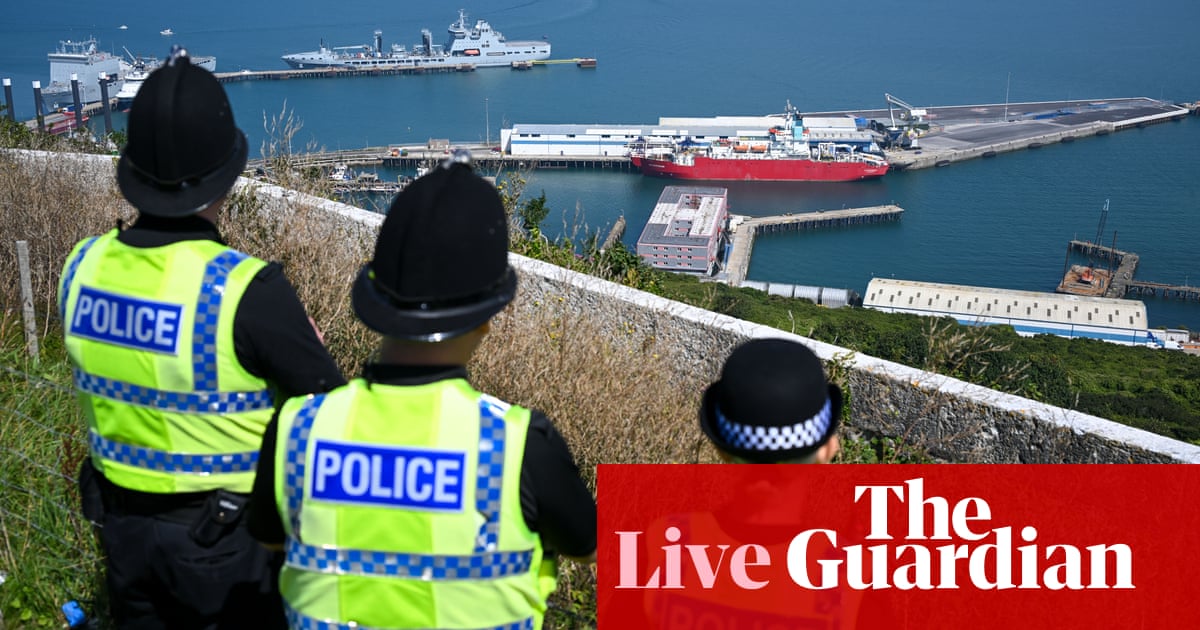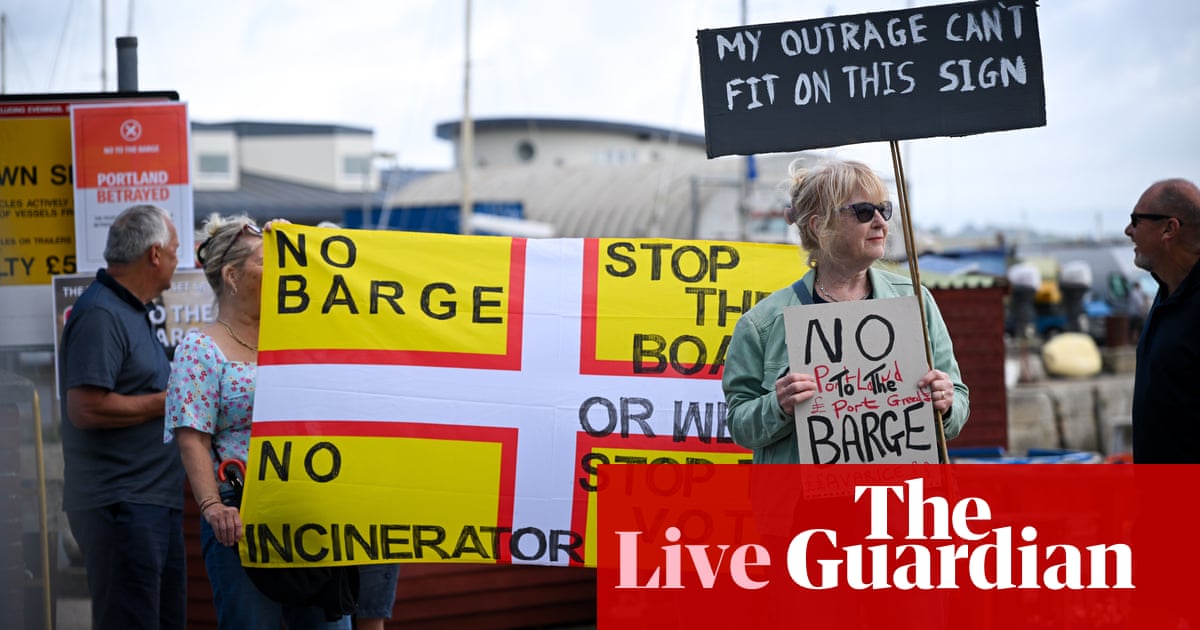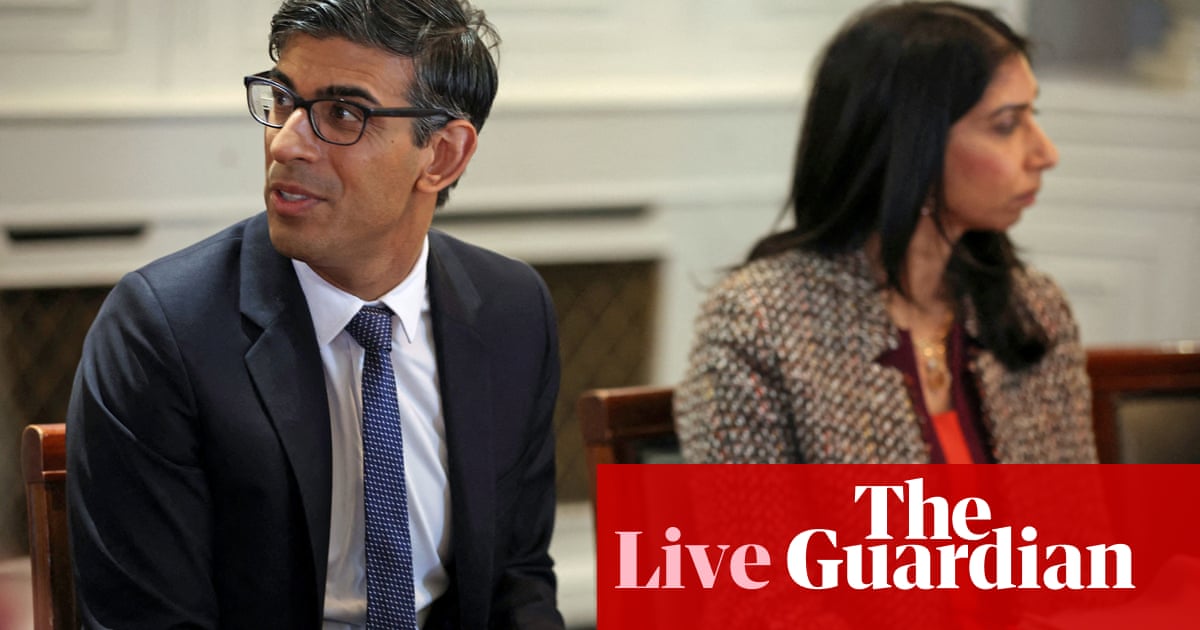
Braverman does not deny government considering housing asylum seekers on cruise ships
Lady Hamwee asks if disused cruise ships might be used to house asylum seekers.
Braverman says her preference is to house asylum seekers via local authorities. They currently house 57,000 people. She wants to get that to 100,000.
The next option is to go for hotels.
But hotel use is an unacceptable cost to the taxpayers, she says. That is why the government said they would use other venues.
She says the government is looking at using disused holiday parks and former student halls to house migrants.
As for whether cruise ships could be used, Braverman just says that the government is talking to a “wide variety of providers and that “everything is still on the table and nothing is excluded”.
Afternoon summary
Steve Barclay, the health secretary, has been accused of lying by the leaders of Unison and Unite, Britain’s two biggest unions. The two general secretaries, Christina McAnea and Sharon Graham, spoke out on the day ambulance staff went on strike in England and Wales after Barclay claimed the unions made “a conscious choice to inflict harm on patients” (see 9.19am) because they were obstructing strike-day contingency planning. (See 3.44pm.) There is more ambulance coverage on our strike live blog.
Suella Braverman has questioned the productivity of civil servants who process asylum claims, and declined to rule out using cruise ships to house people seeking refuge in the UK, after admitting that the cost of providing accommodation for claimants will rise to £3.5bn this year.
The new UN human rights chief has urged the British government to reconsider its plans to deport asylum seekers to Rwanda, warning that in the past, similar “offshoring” schemes had led to “deeply inhuman” treatment of refugees.
Home Office rules that could put millions of EU citizens at risk of job losses or deportation after Brexit have been found to be unlawful by the high court.
Education secretary Gillian Keegan criticised for saying teachers in top 10% of earners in some parts of country
Gillian Keegan, the education secretary, has been criticised for saying teachers are in the top 10% of earners in some parts of the country.
In an LBC phone-in this morning, facing questions about teachers’ pay, Keegan said:
We have raised the starting salary because of the need to attract graduates, £28,000 for someone starting straight from uni and that will be £30,000 by 2024.
My cousin has just started teaching and she is on £28,000. She is 23 and lives in Knowsley [Merseyside]. She is single and lives with her mum and dad but the reality is that she is in a good career, it’s probably within the top 10% of earners in some parts of the country.
As Schools Week points out in an analysis, salary data suggests Keegan is wrong. The average classroom teacher earned £39,000 in 2020-21, while the average salary for all occupations was £38,191.
Bridget Phillipson, the shadow education secretary, claimed Keegan’s comment showed she was “staggeringly out of touch”. Phillipson said:
Teachers are leaving the profession in droves because they are overworked and under-appreciated by this Conservative government, while potential new recruits are turning away from a career in our classrooms.
Housing asylum seekers in cruise ships would be "ludicrous", say Lib Dems
Alistair Carmichael, the Liberal Democrats’ home affairs spokesperson, has said that housing asylum seekers in cruise ship would be “ludicrous”.
Rishi Sunak first raised the prospect of asylum seekers being housed in cruise ships in an interview with the Sun last week. This morning, in evidence to a Lords committee, Suella Braverman, the home secretary, confirmed this was still an option. “Everything is still on the table,” she said.
Rishi Sunak has posted a message on Twitter strongly condemning the Taliban’s decision to ban women in Afghanistan from university education.
Unison and Unite accuse Steve Barclay of lying when he accused unions of obstructing strike day contingency planning
Turning back to the ambulance strike, the row generated by Steve Barclay’s claim that the unions made “a conscious choice to inflict harm on patients” (see 9.19am) because they were obstructing strike day contingency planning seems to be escalating. Christina McAnea, the Unison general secretary, posted messages on Twitter this morning saying she was shocked by the comments, but later she went further, accusing the health secretary of “a complete and utter fabrication”.
Sharon Graham, the Unite general secretary, said the same thing in marginally blunter language. She said:
To say that ambulance unions have taken a conscious choice to inflict harm on patients is a blatant lie. The unions have negotiated critical cover, including 999 calls, at a local level with hosts of NHS trusts. That is how it is done.
Stephen Barclay obviously doesn’t understand how these issues are dealt with in the NHS. That is an embarrassment for him and the government. He has now lost all credibility. Clearly he isn’t the man for the job. He’s well past his sell-by date.
And her Unite colleague Onay Kasab told GB News that far from complaining about the contingency cover for strike day at their meeting yesterday, Barclay was congratulating unions for their work. Kasab said:
I was at the meeting yesterday with the secretary of state, and obviously I must have been in the wrong room. Because when I thought we met with him, he clearly congratulated the trade unions for working with the trusts and for working with the government to put emergency measures in place which made sure that people were safe as possible today.
And yet the statements he made this morning bear absolutely no resemblance to the meeting we were in yesterday, unfortunately.
There is more on our ambulance strike live blog.
Gavin Barwell, who was chief of staff to Theresa May when she was prime minister, has posted a thread on Twitter saying the Centre for European Reform estimate of the damage done to the economy by Brexit (see 1.31pm) shows the need for a new relationship with the EU. Here are two of his tweets.
The government has issued a warning to travellers to expect disruption at airports from Friday if they are entering the country, because of the Border Force strike. In the statement, Steve Dann, the Border Force’s chief operating officer, said:
We apologise for any disruption caused to travellers entering the UK.
Border Force’s number one priority to is keep our citizens safe and borders secure. We are working together with partners across the travel industry to ensure we can continue to meet critical demand and support the flow of passengers and goods through our border.
During the periods of industrial action, travellers should be prepared for disruption.
We encourage everyone to check the latest advice from your operators before travelling.
Schools in many parts of Scotland have announced they will be closed as teachers strike next month in a dispute over pay, PA Media reports. PA says:
Educational Institute of Scotland (EIS) and NASUWT members in primary schools will take strike action action on January 10 while those in secondary schools will walk out on January 11, joined by Scottish Secondary Teachers’ Association (SSTA) members.
Teachers have already rejected a deal which would see most staff in classrooms receive a 5% pay rise, although the lowest earning teachers would get a 6.85% increase.
Several councils, including Highland and Aberdeen city council, have announced that schools in their areas will be shut, while Glasgow city council said it is “likely” they will be.
Britain"s GDP now 5.5% smaller than it would have been without Brexit, thinktank claims
Britain’s GDP was 5.5% smaller by the second quarter of this year than it would have been without Brexit, a thinktank claims.
In his analysis for the Centre for European Reform, John Springford also says that almost all the tax increases announced by Rishi Sunak when he was chancellor in March would not have been needed if the UK had enjoyed the extra tax revenue it would have got from higher growth if it had stayed in the EU.
Sprinford says his analysis is based on the the ‘doppelgänger’ method, which involves finding countries whose economic performance closely matched the UK’s before Brexit and then using their performance since to estimate what might have happened to doppelgänger UK if it had stayed in the UK.
Springford says:
The method provides a counterfactual UK that did not leave the EU. Chart 1 shows quarterly estimates of the cost of Brexit to the second quarter of 2022. UK GDP is 5.5% lower than that of the doppelgänger. Investment is 11% lower; goods trade, 7% lower; and services trade is around the same.
The Brexit hit has inevitably led to tax rises, because a slower-growing economy requires higher taxation to fund public services and benefits. If Brexit had not happened, most of the tax rises that then chancellor Rishi Sunak announced in March 2022 would not have been necessary. If the UK economy had grown in line with the doppelgänger, tax revenues would have been around £40bn higher on an annual basis (if we apply the same tax-to-GDP ratio as in 2021-2 – 34%). In his March 2022 budget, Sunak announced tax rises of £46bn.
Here is chart 1.
When Springford last published an analysis like this, in June, it said that the UK’s GDP was 5.2% lower at the end of 2021 than it would have been without Brexit.
Postal strike blamed as only quarter of energy bill vouchers for December claimed so far
Only around a quarter of the government’s energy bills vouchers have been claimed in December, as postal strikes have left households across the country waiting on payments amid plunging temperatures, PA Media reports. PA says:
Just 27% of vouchers issued under the Energy Bills Support Scheme (EBSS) for people with traditional prepayment meters have been redeemed in December, according to data from PayPoint up to 18 December.
In comparison, 80% of the vouchers issued in October and 73% of November’s vouchers have been redeemed, indicating a sharp drop in the volume of households cashing in their payments this month.
Homes across Great Britain have been promised £400 in payments this winter to help them with energy bills.
For a majority of customers the money is automatically deducted from their energy bills. But those who pay through a traditional prepayment meter have to redeem vouchers.
PayPoint, which has payment services in 28,000 UK retailers such as newsagents and convenience stores, and through which households can cash in their postal vouchers in-store, said that December’s redemption figures were lower than it would expect.
Typically, around three-quarters of all the vouchers are issued by post and a quarter are sent through email.
Just 17% of December’s postal vouchers have been redeemed, a sharp drop compared to 78% of October’s and 74% of November’s vouchers that have been claimed.
Meanwhile, 63% of December’s vouchers issued by email have been claimed.
PayPoint said that the drop-off in claims this month could be linked to strike action in the UK causing delayed delivery.
2.4m EU nationals protected from losing right to stay in UK after court defeat for Home Office
More than 2 million EU nationals living in the UK should be at less risk of losing their right to stay as a result of a court judgment against the Home Office this morning.
The case was brought by the Independent Monitoring Authority, a watchdog set up as part of the Brexit agreement to safeguard the rights of EU citizens living in the UK.
Under the Brexit deal, EU nationals in this country at the time the UK left were allowed to stay provided they could obtain so-called settled status from the Home Office. This was available to people who had been living in the UK continuously for five years.
EU nationals who did not meet the five-year threshold were allowed to apply for pre-settled status. This also allows them to stay, but it is time-limited, and if people do not apply to upgrade to settled status, after five years they lose the right to stay.
According to the IMA, around 2.6 million people were granted pre-settled status before the cut-off point, at the end of the Brexit transition period. The IMA argued in a judicial review that it was unlawful for the government to remove the right to stay from this group.
In a judgment, the high court has accepted the IMA case.
Robert Palmer KC, representing the IMA, said that more than 2 million people were at risk of being treated as “illegal overstayers”. He said:
If a person with [pre-settled] status does not make a further application for settled status or pre-settled status, the effect of the scheme is that that person will automatically lose their right to residence in the UK, making them an illegal overstayer who is liable to detention and removal.
Here is the summary of the court’s ruling from the IMA.
Lord Justice Lane ruled that a right of residence can only be lost in very specific circumstances which are clearly defined in the EU withdrawal and EEA Efta separation agreements.
A loss of rights for failure to upgrade from pre-settled to settled status was not one of those circumstances, and so by imposing a requirement to upgrade residence status the Home Office was acting unlawfully. The judge also said that those granted pre-settled status are entitled to reside permanently in the UK once they have resided there for the required five-year period.
As a result of his findings, the judge has made a declaration that the EUSS in these respects, as it is currently operating, is unlawful.
In a statement after the ruling, the IMA chief executive, Dr Kathryn Chamberlain, said:
I am pleased that the judge has recognised the significant impact this issue could have had on the lives and livelihoods of citizens with pre-settled status in the UK.
When we brought this judicial review, our intention was to provide clarity for citizens with pre-settled status, of which there were over 2.4 million when we filed this case in December 2021. This judgment that the current system is unlawful provides that clarity. We will now liaise with the Home Office on the next steps.
Lord Murray, a Home Office minister, said the government was “disappointed” by the judgment and intended to appeal.
Fears voter ID card delay could disfranchise many in England
A government website allowing people to sign up for free voter ID documents will not be ready in time for a publicity campaign about the electoral changes, the Guardian has learned, increasing fears that large numbers of people could be disfranchised. My colleague Peter Walker has the story here.
Population growth slowing in all four UK nations, ONS figures suggest
Population growth slowed in all four UK nations in the decade to 2021, PA Media reports. PA says:
Wales is estimated to have seen the lowest growth at just 1.4%, down sharply from 5.3% in the previous decade, while Scotland’s population grew by 3.4%, down from 4.7%.
England saw the highest level of growth, with its population increasing by 6.5%, though this was down from 7.4% over the previous 10 years.
Northern Ireland also saw slower growth of 3.4%, down from 4.7%.
Overall, the UK population is estimated to have grown by 5.9% in the decade to June 2021, up 3.7 million to a total of 67 million.
This compares with growth of 7.1% in the decade to mid-2011.
The figures have been published by the Office for National Statistics (ONS) and are based on the 2021 censuses for England, Wales and Northern Ireland, along with separate estimates for Scotland, where the census was delayed to 2022.
Q: Have you found another airline willing to fly asylum seekers to Rwanda, after the original firm pulled out?
Braverman says the Home Office is in discussion with various airlines.
And that’s the end of the session.
Braverman rejects claim there is public support for letting asylum seekers work while their claims are considered
Hamwee tells Braverman she should consider the “strength of feeling” in the Lords in favour of asylum seekers being allowed to work.
Braverman says she has not seen polling on this. And she says she does not think her constituents are in favour.
Lord Blunkett, the Labour former home secretary, goes next.
Q: After the migration figures came out, there was a briefing saying the government would reduce the number of foreign students allowed into the UK – even though students were not to blame for the figures being so high. One report said foreign students would not be allowed to study at lower-quality universities, and another said foreign students might face new restrictions on the relatives they can bring.
Braverman says all the rules relating to the points based system are kept under review.
She says she cannot confirm what changes might be introduced. The government is always considering options.
But she says the government has already reached the target it set for increasing the number of foreign students coming to the UK.
It is right to asks if the government is striking the right balance, she says. Growing numbers of people coming to the UK have an impact, she says.
Q: That briefing was not authorised, and was not government policy?
Braverman says she cannot comment on briefings. She speaks for the Home Office.
Matthew Rycroft says he thinks the briefing that Blunkett is referring to came from No 10. He says he thinks it was “factually accurate”, in that all of these things are under review. But there is no particular plan in mind, he says.
Blunkett says he used to be education secretary. Foreign students subsidise universities, he says. He says he hopes this is recognised.
Lady Sanderson (Con) asks how the government will change modern slavery legislation.
Braverman says she is proud of the legislation introduced by Theresa May.
But the generosity and compassion of the British people are being abused, she claims. The system is being abused by people who are gaming it.
The system will be reformed to make it better able to support victims, she says.












